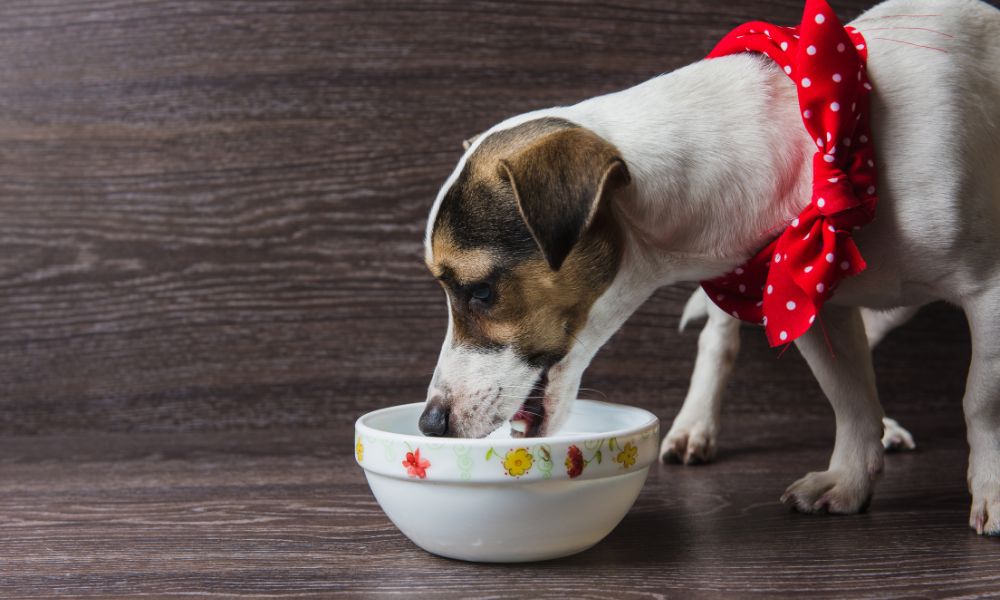I was making a sandwich in the kitchen the other day with some goat’s cheese and salad, when, like always, my dog came over and was very interested in what I was doing.
I like to give him a little bit of what I’m having here and there if I can, but my number one concern is always the health of my dog.
I’d never really given him cheese before—I don’t eat it much.
So, I wasn’t sure if goat’s cheese would be safe for them.
I knew it wasn’t much like their regular diet, but I decided to look into it.
So, can dogs eat goat cheese?
Dogs should not eat goat cheese. In very small quantities as a treat would be fine, but goat cheese is very high in fat, while already containing lactose—which could well give your dog indigestion, cramps and diarrhea. My advice would be not to feed your dog goat cheese.
So, while small quantities won’t do any harm, there are obviously more appropriate treats you can give your dog.
Cheese is a reasonably highly processed human food, and dogs are not equipped to digest it in the same way.
It’s better not to get into the habit of it.
Let’s look further into this.

Is goat cheese good for dogs?
No, is the simple answer.
That said, let’s contextualize why you might be thinking of feeding your dog goat cheese.
For reasons obvious to us humans who have eaten cheese for many thousands of years, dogs love cheese of pretty much any kind.
The fat in the cheese is very attractive to them, and this is most of the reason they appear to love eating cheese.
I absolutely understand the impulse to and indeed the importance of treats for your dog.
Sharing your own food with them can feel like breaking down a barrier.
All of these things are important, of course.
In that sense, cheese is a nice treat for your dog.
But in terms of nutrition, cheese is not good for your dog.
There’s very little in it that it can benefit from, and a great deal that can do it significant harm.
Let’s look into this, then, now that we understand why you might want to feed them cheese in the first place.
Is goat cheese bad for dogs?
Yes, it is.
While, in small amounts and very, very occasionally, it won’t cause a problem, I still think it’s best not to get into the habit at all.
Let’s get into why.
Firstly, goat cheese in particular is incredibly high in saturated fat.
This means that regularly eating it will lead to weight gain and even obesity.
There are many health implications for being overweight, which can be serious and life-threatening.
This high-fat diet can also cause pancreatitis, a potentially life-threatening condition similar to diabetes.
There are many, many symptoms of a high-fat diet.
Furthermore, though, cheese, in general, is really not good news for dogs.
Dogs are omnivores, despite what we might think—but their diet should still be mostly meat.
Dogs are, to varying degrees, lactose intolerant, meaning that any cheese could cause indigestion, pain, and diarrhea.
So, even in small amounts, it’s never going to be good.
In strict moderation, it will be fine as a treat, but it is my view that there are better ways to treat your dog that will also benefit them nutritionally.
So, what could happen if a dog eats goat cheese?
| Related Articles |
|---|
What happens if a dog eats goat cheese?
If it is only a small amount, then the likelihood is there will be no problem.
As I said, it might cause a bit of indigestion, but this is all that will happen.
They aren’t going to poison themselves or anything.
If they eat a lot before you realize they have gotten into it, though, this could spell trouble.
They will almost certainly get indigestion, pain, and probably diarrhea.
Lactose intolerance, is, more or less, a universal feature of mature mammals.
In the wild, the only time they would consume a lactose-containing substance would be when they are suckling.
Once they mature, they lose the enzyme necessary for breaking lactose down.
So, the likelihood is that your dog will be fine if it eats goat cheese.
If you’re at all concerned, take them to the vet.
Is goat cheese better than cow cheese for dogs?
No, it isn’t, really.
Neither are a particularly good idea, since they both contain lactose, which is going to be problematic for your dog.
Cow cheese also encompasses a great many different types of cheese.
There are certainly some that are less rich in fat, like mozzarella and cottage cheese.
These are better, but not great.
Equally, there are many varieties of soft goat cheese available, which would be better than a hard cow cheese.
No matter how you look at it, cheese in general is not good for dogs.
A low-fat, soft cheese is better, whether it’s cow or goat’s cheese.
So, as long as you don’t feed them goat cheese with any regularity and only on rare occasions, you’re unlikely to see any negative repercussions.
That said, there’s also not a tremendous benefit to it either, other than that your dog will enjoy it.
But there are many treats they can more comfortably enjoy, that do not stand a chance of giving them diarrhea or indigestion.
In large quantities and fed regularly, goat cheese stands a real chance of being fatally harmful.
Don’t risk it.
